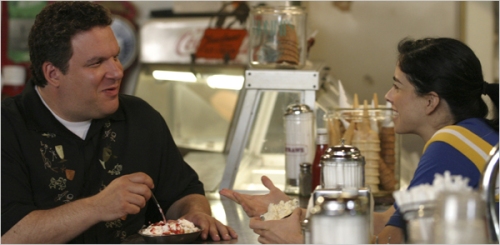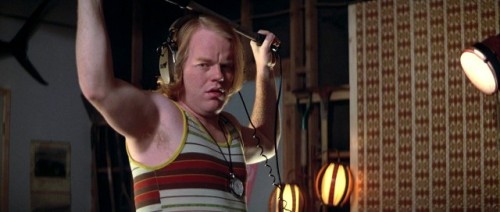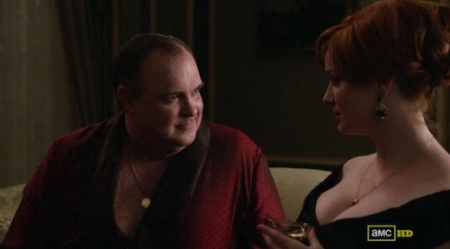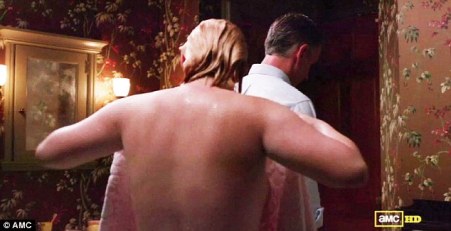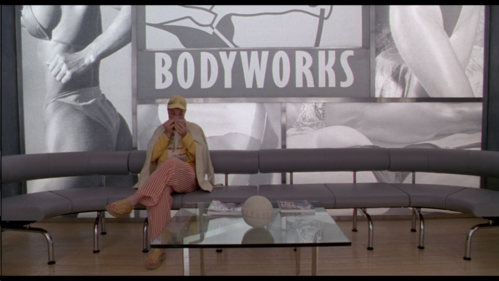Greta Gerwig’s directorial debut doesn’t bring anything new to the cinematic table in terms of story or visual technique; what makes it exciting is her outstanding attention to detail. Having also been a Catholic high school senior in 2002, I knew I was in for something that was going to hit me where I live when I saw the image of Lady Bird’s titular protagonist (Saoirse Ronan) standing in the communion line with her arms folded over her chest. A fair amount of Lady Bird’s charm is based in nostalgia, the escapism of looking back to the past, whether part of a personal or historical timeline. Remember what it was like to have complicated feelings about Dave Matthews Band? Your first cell phone? Pretentiousness as the hallmark of a suitable boyfriend?
But nostalgia in Lady Bird isn’t a fully romanticized experience. Lady Bird breaks from the mold of movies with teenage protagonists focused on affluent, privileged families. Lady Bird’s family struggles with money, which colors most of the protagonist’s relationships. She dates Danny (Lucas Hedges) until she finds him kissing another boy; the scene where he pleads with her not to tell his parents that he’s gay is heartrending. And, relative to this blog, is Lady Bird’s larger-bodied best friend Julie (Beanie Feldstein). There’s a moment where the skinny Lady Bird casually mentions wanting to lose weight to Julie. “Really?” Julie responds, her bewilderment and self-consciousness immediately familiar to me and, I’m sure, most other fat audience members.
Lady Bird and Julie share a paradigmatic protagonist-sidekick dynamic. Lady Bird is louder and more confident; Julie is more reserved, and tends to follow her friend’s lead. Julie is also, typical of fat characters, more socially awkward than Lady Bird. Julie’s ineptitude is subtle and relatable, not clownish. She fawns over math teacher Mr. Bruno (Jake McDorman), but her crush never inflates to the point where she is a buffoon (or a victim); she is gracious when he introduces her to his pregnant wife. A sequence of characters auditioning for the school musical nicely illustrates the friends’ contrasting personalities: Lady Bird does a fiery rendition of the Barbra Streisand-popularized “Everybody Says Don’t,” while Julie opts for the gentle and out-of-place hymn “Prayer of St. Francis.” Julie, however, is cast in a substantial role in the musical while Lady Bird is relegated to the chorus. Julie also has a knack for math while Lady Bird struggles with her grades, resisting the trope of a fat character being worse at everything than their thin counterpart.
While the two girls are seemingly inseparable, Lady Bird decides in the second half of the school year that she wants to reinvent herself and ditches Julie in favor of attaching herself to rich, popular Jenna (Odeya Rush) and cool, intellectual Kyle (Timothee Chalamet). Jenna and Kyle are conventionally attractive, but also smirking and apathetic. Maintaining relationships with Jenna and Kyle means adopting a facade, a tactic completely alien to Lady Bird. Her first attempt to get Jenna’s attention is to insult Sister Sarah Joan (Lois Smith) and suggest that a revenge prank is appropriate for a routine admonishment against violating the school uniform. Julie is shocked and reminds Lady Bird that she’s fond of the nun, which Lady Bird immediately denies. Lady Bird lies to Jenna about where she lives (a switch from describing herself to Danny as being “from the wrong side of the tracks”) and takes up smoking to impress Kyle.
Of course, Lady Bird is too headstrong to accommodate her new friends for long. She is seriously disillusioned after she has sex for the first time with Kyle, assuming it his first time too, only to have him casually reveal that he’s had several partners before her and is much more casual about sex than she. The breaking point comes on the way to prom. Lady Bird reluctantly agrees with their plan to ditch prom, but bristles when “Crash Into Me” by the Dave Matthews Band comes on the radio and Kyle disparages it. There is a scene earlier in the film, after Lady Bird finds Danny cheating on her, where she and Julie are crying and singing along to “Crash Into Me.” No longer able to tolerate trying to be someone else, she tells Kyle to drive her to Julie’s home. When Jenna asks who Julie is, Lady Bird defiantly replies, “She’s my best friend.”
Part of Lady Bird’s attention to detail are the numerous loose threads that the film gives us. These aren’t plot holes, rather, accurate reflections that life rarely comes with neat conclusions, and rarely allows us to witness conclusions to struggles in which we aren’t immediately involved. We see supporting characters moving in and out of personal problems, only glimpsing their interior world long enough to see them as human beings. Kyle drops Lady Bird off at the apartment complex where Julie lives– confirming that, like Lady Bird, Julie is also an outsider at their school due to her family’s economic circumstances. Julie is revealed to be in her apartment, still in her bathrobe, crying. The audience never finds out why, we simply see Lady Bird ask for her forgiveness and convince her to come to prom. At prom, the reunited friends dance joyfully with each other and hang out until dawn, at which point Julie reveals that she is spending the summer with her dad and will be going to the local community college, while Lady Bird is moving away in the fall.
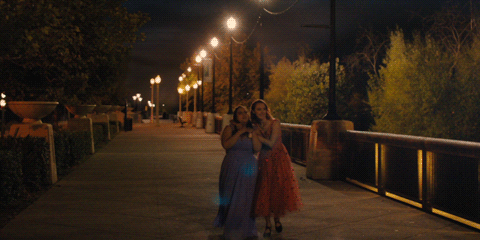
Julie (Beanie Feldstein) and Lady Bird (Saoirse Ronan), prom night
The end of the film finds Lady Bird in her first days at Barnard in New York City. She seems to have synthesized her experiences over the course of the film, excited to be cool and worldly in the way that drew her to Kyle and Jenna, but also unrelentingly true to herself. At her first college party, she asserts her belief in God in a conversation with a self-assured atheist and, when asked her name, drops her self-appointed nickname and introduces herself by her given name, Christine. Even though Julie is not present in the latter portion of the movie, which focuses specifically on Lady Bird’s troubled relationship with her mother (Laurie Metcalf), there is a direct parallel between Lady Bird asserting herself as Julie’s friend to Kyle and as a theist at the party in New York. Lady Bird’s relationship with Julie is the childhood that she’s leaving behind her, but also an essential part of who she is. Even if the two go their separate ways, we know that they are both better people for having learned how to apologize and forgive. Lady Bird suggests that all its characters could easily be the protagonist of their own movie. Although Julie fits the awkward fat friend trope, we also get glimpses of her inner life, suggestions that she has also had a coming of age over the course of the film. The resonant emotional honesty and compassion of Lady Bird redeems its reliance on stock character types.
See also:
America Magazine: Greta Gerwig’s Lady Bird Is a Rallying Cry for Catholic Schoolgirls Everywhere




